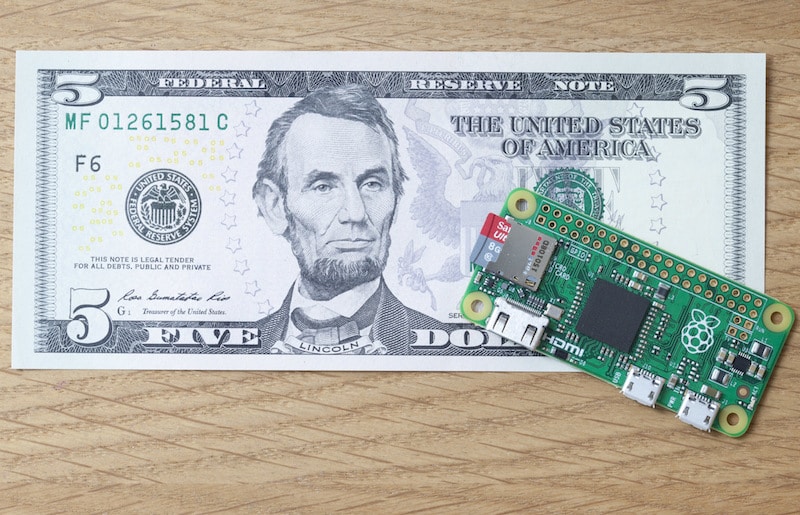The Raspberry Pi Foundation has revealed that the latest iteration of its micro-computing board, the Raspberry Pi Zero, has completely sold out after just 24 hours of being on sale. The Raspberry Pi Zero, which cost just $5 (or £4) has proved to be such a success that over 20,000 units were sold in a day.

The original Raspberry Pi Model B and its successors put a programmable computer within reach of anyone with $20-35 to spend. Since 2012, millions of people have used a Raspberry Pi to get their first experience of programming. At the start of this year, they began work on an even cheaper Raspberry Pi to help more people take the plunge.
Makers building connected devices and robotics projects are likely to be first in line in the queue for the Zero. “We believe it will be particularly useful for people looking to do robotics or IoT projects — very small and low power, but able to drive a display and keyboard when you want to do debug”, says Pi co-founder Eben Upton.
So what does $5 get you:
- A Broadcom BCM2835 application processor
- 1GHz ARM11 core (40% faster than Raspberry Pi 1)
- 512MB of LPDDR2 SDRAM
- A micro-SD card slot
- A mini-HDMI socket for 1080p60 video output
- Micro-USB sockets for data and power
- An unpopulated 40-pin GPIO header
- Identical pinout to Model A+/B+/2B
- An unpopulated composite video header
- A tiny form factor, at 65mm x 30mm x 5mm
The miniaturised Zero features a core that is 40 percent faster than the Raspberry Pi 1, with 512MB RAM, a MiniHDMI port and two Micro USB ports, including one for power.
The Raspberry Pi Foundation said that the Zero, which will be made in Wales and runs full Raspian as well as applications including Scratch and Minecraft, was as revolutionary as the first Pi. "It is about as big a change as the original Raspberry Pi was", Upton said. "Really everything we've learned has been packed into this one device".
As before, users will have to supply their own power, keyboard, mouse or input device, and screen. But many of the Pi Zero's components have been simplified or otherwise removed in order to keep the cost of the board as low as possible. "Every single component on that board had been made to justify its existence," Upton explained.
However, getting the Zero down to the bare-bones price of £4 was not just about cutting features, it is to some extent a result of the Raspberry Pi's massive success as the UK's most successful computer in decades. Selling and making more computers has enabled it to cut costs where it was not able to before, and be even more ambitious with the price. "There are economies of scale that weren't available to us when we started", Upton admits.
[contact-form-7 id="3204" title="memoori-newsletter"]
The Pi Zero, with such a tiny form factor and negligible cost is something that could easily become adopted in an IoT or BIoT (Building Internet Of Things) hardware strategy, with a processor and enough RAM to move simple analytics to the edge. A recent Memoori report shows that “major disruption is on its way as both the competitive landscape and the supply chain will change for all those suppliers that want to engage in the wider BIoT business, which will reach $76Bn by 2020”.
A current example of this is the successful The Things Network Kickstarter campaign, based on the Arduino Uno board with LoRaWAN connectivity with connected units starting $40 (£27). The Pi Zero could represent an even lower price entry point for IoT if combined with connectivity hardware. The original Pi has already seen large vendors place in-memory capabilities as a showcase of what is entirely possible with the device from a software point of view.
Whether $5 is the floor for a single board computer remains to be seen, Upton suggests this is as low as things can go for the foreseeable future at least. We can be confident that the Raspberry Pi Zero will continue its staggering sales record for the foreseeable future too, the day after the release Upton wrote, “In answer to a frequently asked question: yes, we will continue to make Zeros for as long as you guys want them. It looks like demand will continue to outstrip supply for a while if yesterday’s rush is anything to go by”.



